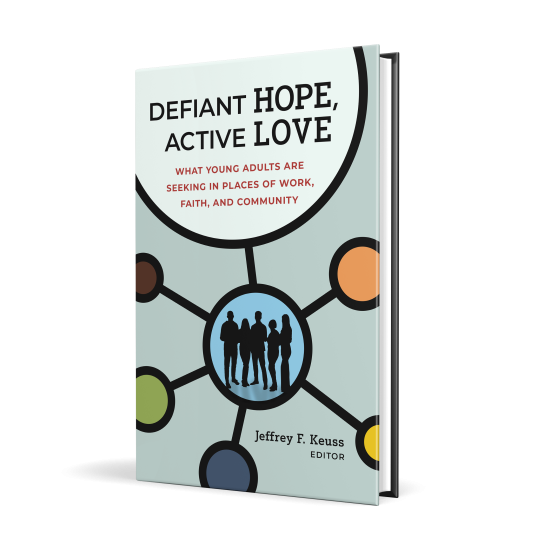
On August 5, 2021, the Atlanta Braves moved above the .500 mark for the first time all season with a three-game sweep of the St. Louis Cardinals. One might think that such an exciting milestone would have come at the hands of an epic late-inning grand slam or a clutch piece of two-out hitting. No, the game that finally got the Braves over the proverbial “hump” — a mental block they seemed to have had most of the season as they alternated wins and losses — came as they simply left their bats on their shoulders. With the game tied and runners at each base, the “go ahead” and “insurance” runs resulted from the Braves just standing there and watching as bad pitches went by and not engaging with ones that might get them in trouble. Four players did not try to swing for the fences to be the hero, but they stood patiently as balls flew past. In the end, discernment and self-control won the day, not flashy displays of power or prowess.

Sarah Blackwell
As the pastor at my church reminded us in a recent sermon on Paul’s list of fruits of the spirit, self-control is notably at the end of the list — a fitting place for probably our least favorite to focus on (Galatians 5:22-23, NIV). There are many areas in which we can exhibit self-control, but one of the most important is in the words we choose, either spoken or written. Scripture is full of reminders about the damage that can be done by an untamed tongue, such as: “the tongue is a small part of the body, but it makes great boasts. Consider what a great forest is set on fire by a small spark” (James 3:5). My Papa Bob was not one for a lot of chatter but, from time to time, he would take a teachable moment with us grandkids. I remember him telling me that sometimes we just needed to keep our “traps” shut, evoking Proverbs 17:28: “Even fools are thought wise if they keep silent and discerning if they hold their tongues.” How can we better discern when to open our mouths or when to keep them shut? When is saying nothing the path to winning?
This is my plea to my fellow Christians: quit swinging at the fences at every bit of junk that comes whizzing past you. Stop engaging with the pitches that will cause you trouble. Don’t feel like you need to swing from your heels at everything that comes your way. The number one place I see this happening in our daily lives is comments on social media. I am not talking about the “Congratulations” or “Look how they’ve grown” or “Happy Birthday” comments. These types of interactions can help us keep connected and build community. I am talking about the “slap-me-in-the-face-when-I-open-my-social-media-in-the-morning” comments.
I am not sure if some of you realize that the comments you post in your tribal echo chambers, by some glitch of the social media algorithms, sometimes end up being the first thing I see that day. The ones where you berate or belittle other humans that you have never met. The ones where you mock trauma that you have never experienced. The ones where you purposely “other” different groups to the point that you make them seem less than human. The ones where you share misinformation because you have not taken the time to research and reflect on your own. The ones that make me question if we are even following the same God.
Honestly, it is why I have blocked seeing posts from you. I miss out on the happy pictures of your sweet children and grandchildren and vacations and special life moments because it hurts too much to see how you will be so kind and loving to those you consider “in” your circle and the anger and hatred that will, moments later, show up in my feed. I hate to break it to you, but I do not know anyone who has drastically changed their mind on an issue because of harsh words typed by a stranger on the internet. In fact, I believe it tends to entrench people more.
No doubt the pandemic has made it even worse as we are removed from all but our most loyal and faithful supporters. Few of us have spent much, if any, time around anyone who is not like ourselves. This tends to reinforce and reconfirm our biases. It makes us bolder when we hear others that believe the same and causes us to behave in ways we never would face to face. I am not immune to these temptations, either. Each day, however, I am more aware of how acting on these impulses in public forums is not useful for building the kingdom of God.
I have friends who left their communities of faith, not because of the political beliefs of other members, but because of the hate spewed in public forums by people they thought were fellow travelers on the journey to holiness. What has happened to Christian civility? What used to be “disagreements about the role of government in society” have turned into all-out slugfests where one of the first things that is destroyed is our Christian witness. For when we make others seem less-than-human in our twisted minds, it excuses us from looking for the image of God, imago Dei, in them.
I have heard many pastor friends of mine over the last year mention how hard it is for them to love and serve members of their congregation over a year’s worth of social media posts and comments. I tell you this to try to heal our communities — you are paining the people who are trying to love you and form you spiritually. They ask themselves: “Are they even listening to the sermons? Do they even care what Jesus says? What went wrong in spiritual formation? How can I even be in relationship with ones who are destroying from the inside out the community we are trying to build?”
I also am in community with many Christians at the tail end of the millennial generation. Can they even believe that the same people that taught them “Jesus Loves Me” in Sunday School are now clearly disregarding Jesus’s commands to love neighbor in favor of personal liberty? You read them the story of the Good Samaritan, but you forgot that it was told by Jesus to explain that “neighbor” also meant your most hated enemy in order to teach self-sacrifice. You sang songs of love and grace from the choir lofts and pews and yet, to the anonymous world of the internet, you attack and show no empathy. How are these young people to feel accepted in church families when they may have different beliefs, and they see you berating others that feel the same way? Is your church going to be a place they feel comfortable worshipping and seeking spiritual formation? Can you guess why they often feel like they are on the margins and must tip-toe around their big faith questions? Do you wonder why youth that grew up in your church are no longer found in your pews as adults?
I am not saying Christians should not have political beliefs or be engaged in our government. We need Christian witness in those spaces. It is simply that the decorum and respect we should show our fellow humans — God’s creations — is often disregarded. In Uncommon Decency: Christian Civility in an Uncivil World, Richard Mouw writes, “Each person is a very precious work of divine art. To make light of an artist’s work within the artist’s earshot is a cruel thing to do. To demean one of God’s most precious artworks when God is listening — and he always is — crudely dishonors the divine artist.” We must approach others with a true posture of humility remembering that God is their creator, too.

(Unsplash)
And so, I ask you, both Christians I know and do not know, please reconsider. Just stop. Don’t type that comment. Pause. Utilize your discernment. Assess what you are going to say. Display some patience at the plate. I truly desire this for the good of our Christian communities and God’s kingdom on Earth. I offer this not as a judgment but as an encouragement. Remember that these may be the only words of Christian witness that someone may ever read of yours. Ask yourself: is this kingdom building? The world is watching. Will we live lives that are truly different than those around us? Will we make the Christian life compelling in its radical love? Can you imagine the testimony to true Christian forgiveness and love if you simply stated you disagreed with the position of the other side, but you continued to pray for a path through the disagreement and then worked together to get there? What if you openly showed love to your enemy? What if you sincerely asked, “What in your life has brought you to the point that you believe this way?” What if you took the time you are spending in echo chamber spaces on the internet or television to serve someone else? What if Christians organized and lived out their faith in a way that cared so much for justice and serving the poor that the government did not have to intervene in the first place? These are all questions I can focus on in my own life, too.
In Luke 6:32, Jesus reminds us that everyone loves the people that love them back. The true separation of a Christian lifestyle is finding a way to be counter-cultural in how we treat the stranger and the enemy. I am not advocating we all have the same positions on every subject. Sometimes though, our greatest Christian witness may simply be to keep our mouth shut. Turn off the pundits. Leave the echo chamber. Keep our laptops closed. Delete that comment. Tame your tongue (or fingers in this case). Leave that bat on your shoulder. Just like those Atlanta Braves hitters, your patience, self-control, and reticence may result in someone walking home. And in that, we all win.
Sarah Blackwell graduated with a Masters of Divinity from Gardner-Webb School of Divinity in December of 2020. Sarah is an ordained deacon and currently volunteers with youth and young professionals at Providence Baptist Church in Charlotte, North Carolina. Raised a St. Louis Cardinals fan, some of her favorite childhood memories are of watching the 1985 I-70 series at school and seeing Ozzie Smith back flip before a game. She and her husband, a lifelong Atlanta Braves fan, enjoy watching baseball with their two sons. Follow her writings at proximitytolove.org.






